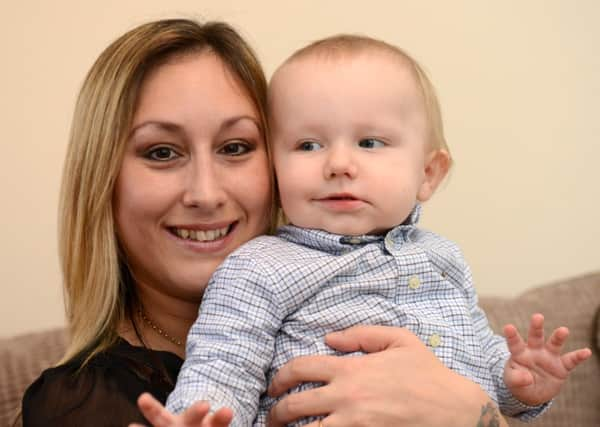Mum joins urgent calls to screen for infection


It comes as the newborn health screening programme was expanded last week, with a routine heel prick test in babies now testing for four more conditions.
Tania Holmes’s son Blake died at just 25 hours old in 2009, after doctors failed to recognise she had an easily-preventable bacterial infection called group B strep (GBS).
Advertisement
Hide AdAdvertisement
Hide AdThe 31-year-old, of Church Walk, Worthing, said: “It’s great that they’re screening for all these other conditions, but group B strep kills more babies every year than everything they are screening for.
“It’s a bit of a kick in the teeth for everyone that has been campaigning to raise awareness about this.”
Group B Streptococcus is the UK’s most common cause of life-threatening infection in newborn babies and of meningitis in babies up to the age of three months.
It is a normally-occurring bacterium which is found in many men and women. For most, it is harmless, but if it is passed from mother to baby, it can cause long-term health problems or even be fatal.
Advertisement
Hide AdAdvertisement
Hide AdA swab can be carried out late during a woman’s pregnancy to find out if she is a carrier. If she is, it would not necessarily mean she would pass the infection to her baby, but she would be given antibiotics at the onset of labour as a preventative measure.
Tania said: “At the moment, they only use risk factors to see if a woman is likely to have GBS, but I had three of them and it was still missed.
“I had never heard of it, so I had no idea what to look out for. We need to make women more aware.”
The risk factors are if a mother has previously had a baby infected with GBS, if she was found to carry GBS in her urine at any time in her pregnancy, if labour starts before 37 weeks, if there is a prolonged rupture of the membranes 18 hours before delivery and if the mother has a raised temperature during labour.
Advertisement
Hide AdAdvertisement
Hide AdCharity Group B Strep Support wants to see the NHS routinely swab for the condition during pregnancy. Now, unless a doctor has a concern, a woman can only be screened for the infection by paying for a swab kit privately.
The four conditions added to the heel prick test, which is done in newborn babies at five days old, are all inherited metabolic diseases.
The charity believes the GBS screening should become standard, as the infection kills more than all of those conditions added together. And also because detection rates have not improved over the last ten years.
Jane Plumb, chief executive of Group B Strep Support, said: “Surely any country with such a resounding failure to effect change would be looking at successful prevention strategies in other countries and at the very least piloting them in the UK. Why aren’t we?
Advertisement
Hide AdAdvertisement
Hide Ad“Most developed countries routinely offer antenatal testing for group B strep. At least 20 countries use this strategy. Countries which do have seen their rates of group B strep infection in newborn babies fall dramatically.”
She added: “How many more babies must die before the UK changes its strategy?
“It is unacceptable to continue with such a manifestly failing policy. Group B Strep screening would save the NHS money and spare huge emotional cost to families caused by their babies suffering avoidable infection.”
Tania now has another son, Bailey, who is one. Fortunately, he was born healthy, but Tania said her pregnancy was stressful because of what happened to Blake. “I was terrified,” she said. “Any little thing that happened made me very worried.
Advertisement
Hide AdAdvertisement
Hide Ad“Then, after Bailey was born, I suffered with really bad post-natal depression. I felt really ungrateful that I had been blessed with another baby, so I tried to struggle on, but I eventually got help five months after I had a mini-breakdown.
“I’m much better now, as I’ve got help.
“I just want women to be aware of GBS so they can hopefully prevent anything happening to them or their babies.”
For more information, see www.gbss.org.uk